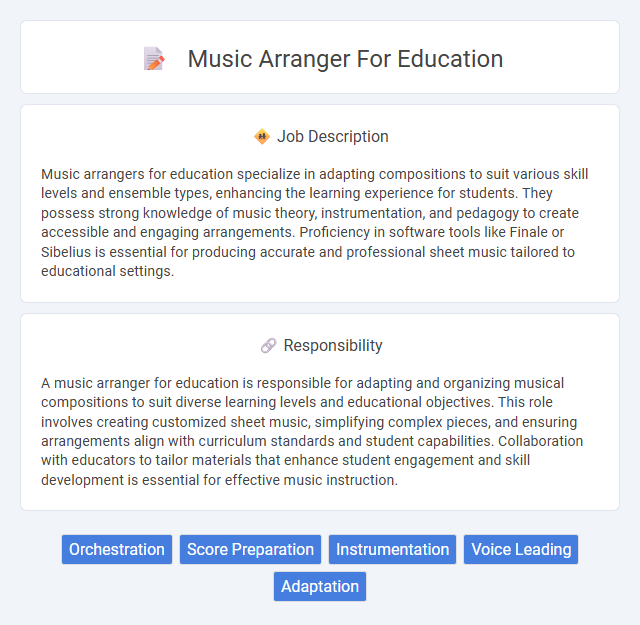
Music arrangers for education specialize in adapting compositions to suit various skill levels and ensemble types, enhancing the learning experience for students. They possess strong knowledge of music theory, instrumentation, and pedagogy to create accessible and engaging arrangements. Proficiency in software tools like Finale or Sibelius is essential for producing accurate and professional sheet music tailored to educational settings.
Individuals with a strong passion for music and proficiency in musical theory are likely to be well-suited for a music arranger role in education. Those who enjoy collaborative work and possess patience for teaching diverse student abilities might find the job fulfilling. Candidates lacking creativity or adaptability may face challenges in meeting the dynamic demands of arranging music for various educational levels.
Qualification
A music arranger for education must possess strong proficiency in music theory, composition, and orchestration to effectively adapt and create musical scores suitable for various educational levels. Expertise in diverse musical styles and familiarity with teaching methodologies enhance the ability to tailor arrangements that support curriculum goals and engage students. Certification in music education or a related degree, combined with practical experience in classroom or ensemble settings, is highly valued for this role.
Responsibility
A music arranger for education is responsible for adapting and organizing musical compositions to suit diverse learning levels and educational objectives. This role involves creating customized sheet music, simplifying complex pieces, and ensuring arrangements align with curriculum standards and student capabilities. Collaboration with educators to tailor materials that enhance student engagement and skill development is essential for effective music instruction.
Benefit
Hiring a music arranger for education likely enhances curriculum quality by tailoring compositions to student skill levels and learning objectives. This specialization probably facilitates more engaging and accessible musical experiences, which can improve student motivation and retention. The role may also support educators by reducing preparation time and providing professionally arranged materials aligned with pedagogical goals.
Challenge
A music arranger for an education job will likely face challenges in adapting complex compositions to suit varying skill levels of students, ensuring both engagement and learning effectiveness. Balancing creativity with curriculum standards may pose difficulties in maintaining educational objectives while fostering musical expression. The probability of encountering tight deadlines and resource limitations could add pressure to produce high-quality arrangements consistently.
Career Advancement
Music arrangers in education enhance curriculum by adapting compositions to various skill levels, fostering student engagement and musical growth. Mastery of diverse genres and proficiency with digital notation software position arrangers for leadership roles such as curriculum development coordinator or educational program director. Pursuing advanced certifications and workshops in music theory and pedagogy significantly boosts career advancement opportunities within academic institutions.
Key Terms
Orchestration
Music arrangers specializing in orchestration for education design and adapt compositions to suit school ensembles, ensuring accessibility while preserving musical integrity. They analyze scores to assign instruments effectively, balancing timbre, range, and technical ability to enhance student learning and ensemble performance. Expertise in music theory, instrumentation, and educational pedagogy is essential for creating arrangements that support curriculum goals and foster musicianship.
Score Preparation
A music arranger specializing in education focuses on score preparation by adapting and organizing musical compositions to suit various classroom settings and skill levels. They ensure clarity, accuracy, and accessibility in the sheet music, facilitating effective instruction and performance. Mastery of notation software and understanding of educational curricula contribute to creating tailored scores that enhance learning outcomes.
Instrumentation
A music arranger specializing in education expertly adapts compositions to suit diverse student ensembles, emphasizing optimal instrumentation for varying skill levels and available instruments. Their work fosters effective learning by selecting and balancing parts for woodwinds, brass, strings, and percussion, ensuring both accessibility and musical integrity. Proficiency in orchestration techniques and pedagogical goals enables arrangers to create engaging, educationally sound scores that enhance instrumental training and ensemble cohesion.
Voice Leading
A music arranger specializing in education emphasizes voice leading techniques to create smooth, coherent harmonic progressions that enhance students' understanding of musical structure. Mastery of voice leading helps arrangers design parts that are singable and pedagogically effective, aiding vocal ensembles in developing tuning, balance, and blend. Integrating voice leading principles in educational arrangements supports the transition from simple melodies to complex harmonies, fostering advanced musicianship in learners.
Adaptation
A music arranger for education specializes in adapting complex musical compositions to suit various learning levels and ensemble types, ensuring accessibility for students. This adaptation involves simplifying rhythms, harmonies, and instrumentation while preserving the original piece's educational value and artistic integrity. Mastery in educational music arrangement enhances student engagement and supports curriculum goals by providing tailored, performable scores.
 kuljobs.com
kuljobs.com